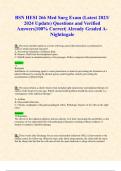Exam (elaborations)
BSN HESI 266 Med Surg Exam (Latest 2023/ 2024 Update) Questions and Verified Answers|100% Correct| Already Graded A- Nightingale
- Institution
- Nightingale College
BSN HESI 266 Med Surg Exam (Latest 2023/ 2024 Update) Questions and Verified Answers|100% Correct| Already Graded A- Nightingale Q: The nurse should explain to a client with lung cancer that pleurodesis is performed to achieve which expected outcome? A. Prevent the formation of effusion fluid. ...
[Show more]



